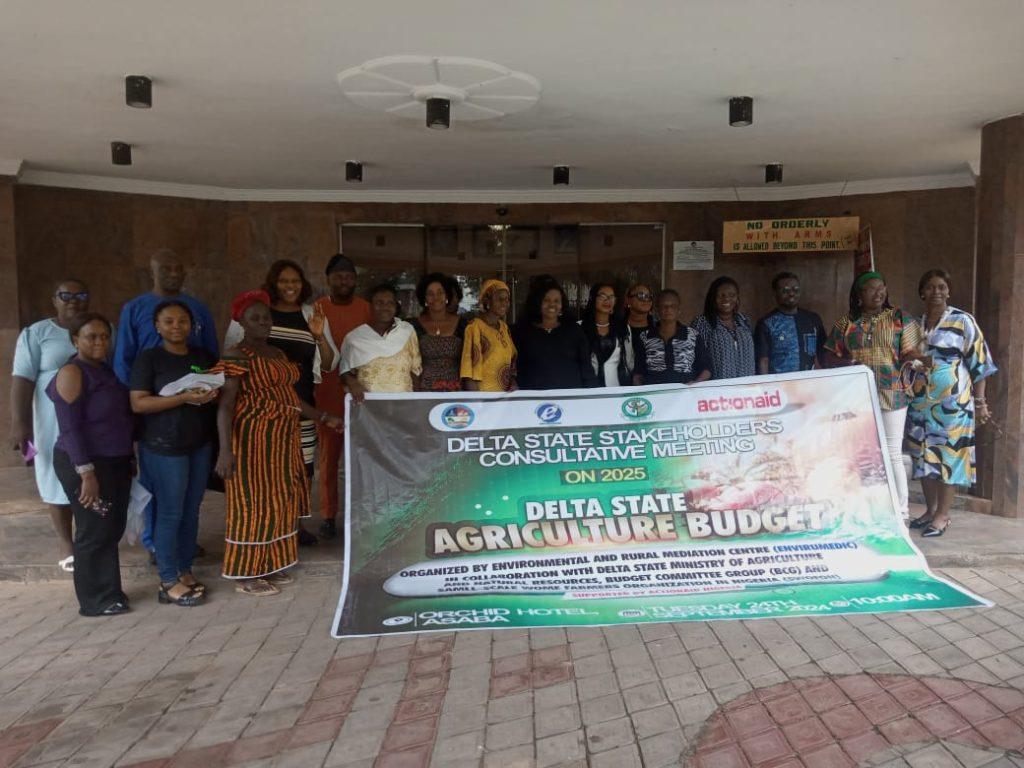The Budget Committee Group (BCG), Small-scale Women Farmers Organisation of Nigeria (SWOFON), and the Environmental and Rural Mediation Centre (ENVIRUMEDIC), supported by ActionAid Nigeria, have jointly called on the Delta State Government to urgently increase its funding allocation to agriculture in order to avoid the escalating food insecurity in the State.
Speaking at a press briefing held in Warri on Friday, May 9, the groups presented the Delta State 2025 Agriculture Budget Analysis Report. According to the report, the state’s 2025 budgetary allocation to agriculture stands at a meager 0.96%, a significant drop from the 1.26% allocated in 2024 and a far cry from the 10% benchmark set by the Maputo Declaration. Stakeholders argue that this downward trend signals the government’s waning commitment to agricultural development, despite rising hunger and poverty levels across the state.
Chief Monday Ogheneruona Itoghor, Executive Director of ENVIRUMEDIC, who read the joint statement, criticized the state’s poor per capita agricultural investment of ₦1,673.40 from a total sectoral allocation of ₦9.43 billion, saying it is grossly inadequate amid harsh economic realities and the depreciating value of the Naira. He also highlighted the disproportionate drop in allocations targeted at smallholder women farmers, who make up the majority of the agricultural workforce.
The report revealed that the Ministry of Agriculture’s Mobilization of Rural Women for Sustainable Agriculture (MORWSA) unit saw its allocation slashed by 50% compared to the previous year. Furthermore, while ₦2.36 million was allotted to the Job Creation Bureau, the exact amount dedicated to the Youth Agricultural Entrepreneurs Programme (YAGEP) remains unclear, making transparency and monitoring of youth-focused interventions increasingly difficult.
Agricultural extension services, critical for boosting productivity and ensuring food security, continue to suffer from chronic underfunding. This has led to a breakdown in support systems for farmers at a time when they need technical guidance the most. The stakeholders also decried the absence of a budget line for post-harvest loss reduction, despite the fact that Nigeria suffers an estimated 50% loss in agricultural produce after harvest, heavily impacting small-scale farmers.
Read also:
- Delta SUBEB, UBEC launch sensitisation drive for Agricultural Education Programme
- Delta Head of Service urges Civil Servants to embrace agriculture for sustainable future
- FG, NDDC, IFAD Transform Niger Delta Farming: How 12,750 farmers are being empowered with climate-smart Agriculture
Climate change mitigation, another crucial component of sustainable agriculture, also saw a disappointing cut in the 2025 budget. The stakeholders warned that this could reverse previous gains made in combating the environmental impact on food systems, especially for smallholder women farmers already battling unpredictable weather patterns.
While the Delta State Government was commended for investing in mechanization, rural infrastructure, and the provision of drought-resistant seeds, stakeholders stressed that these efforts remain insufficient without a holistic funding model that prioritizes sustainability and inclusivity.
The groups called for the establishment of storage facilities in all Local Government Areas to help women farmers reduce post-harvest losses. They also urged the government to provide women-friendly farm machinery and promote organic farming methods that can restore soil health and enhance productivity.
The report recommended that agricultural line items be clearly spelled out in the budget, especially those under the Job Creation Office, to allow proper monitoring and tracking. It also advocated for the relocation of youth-in-agriculture programs to the Ministry of Agriculture, where sectoral expertise can ensure better implementation.
To achieve food security, reduce poverty, and diversify the state’s economy through agriculture, the stakeholders concluded that Delta State must urgently scale up investment in smallholder women farmers, enhance access to credit, improve monitoring and evaluation, and foster inclusive policy-making through active engagement with Civil Society Organizations and farming communities.
